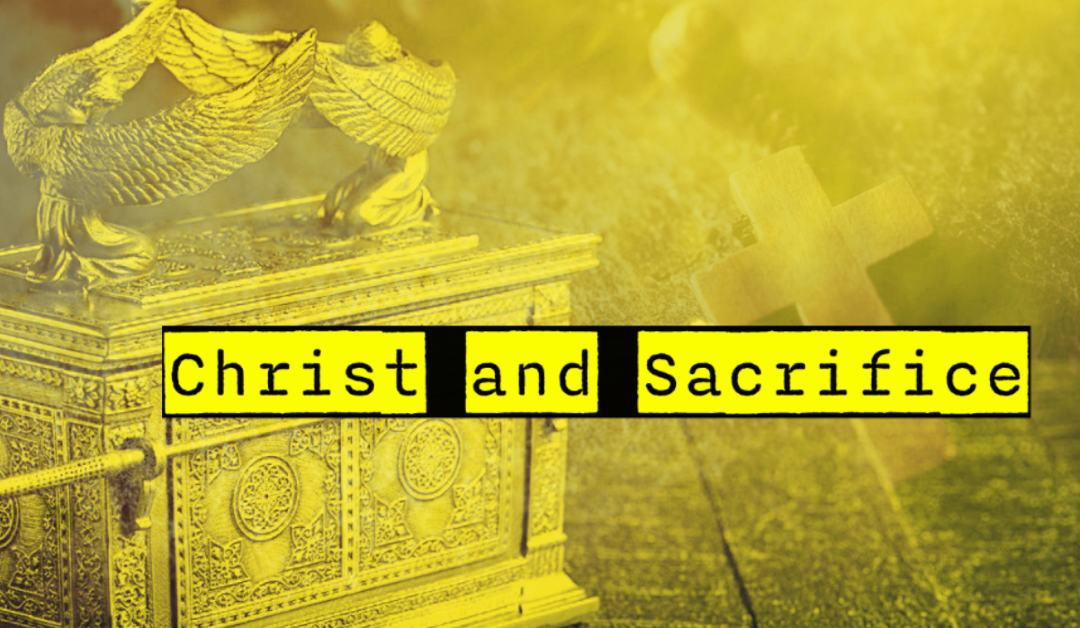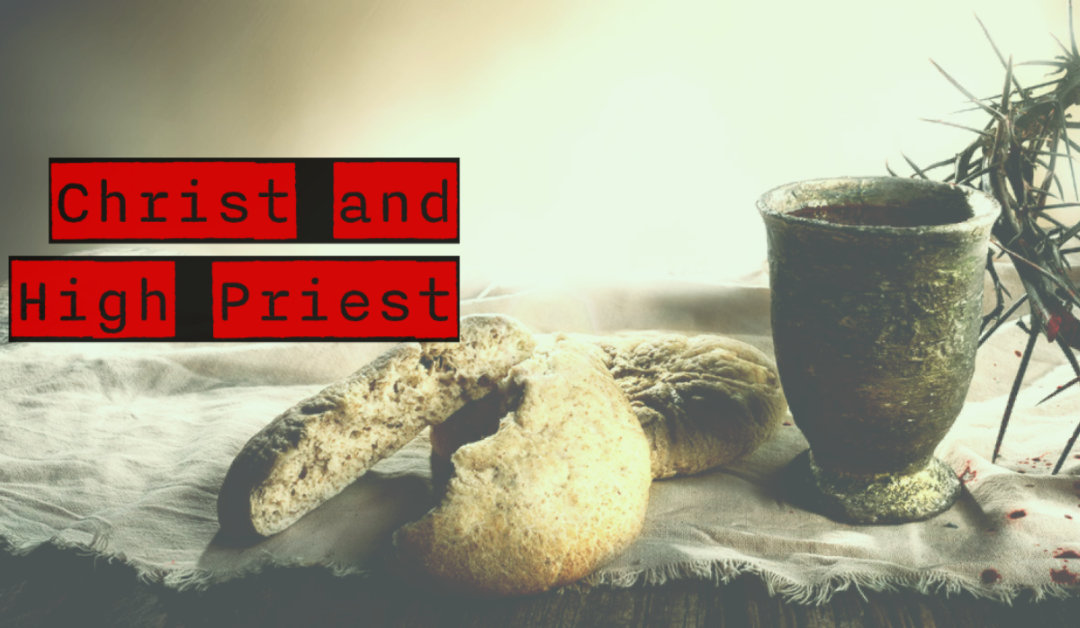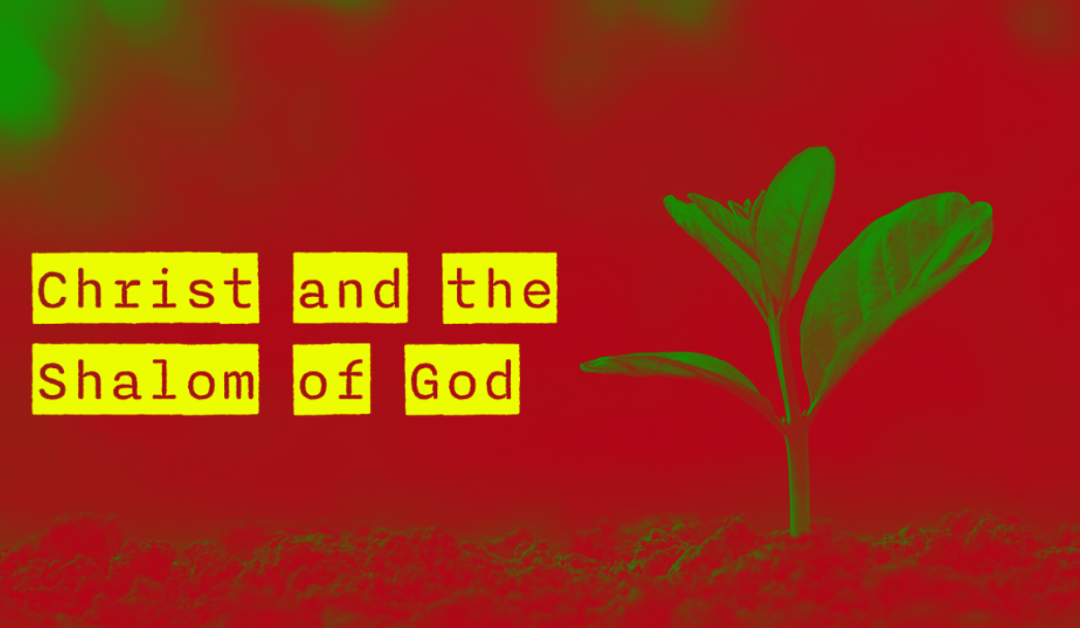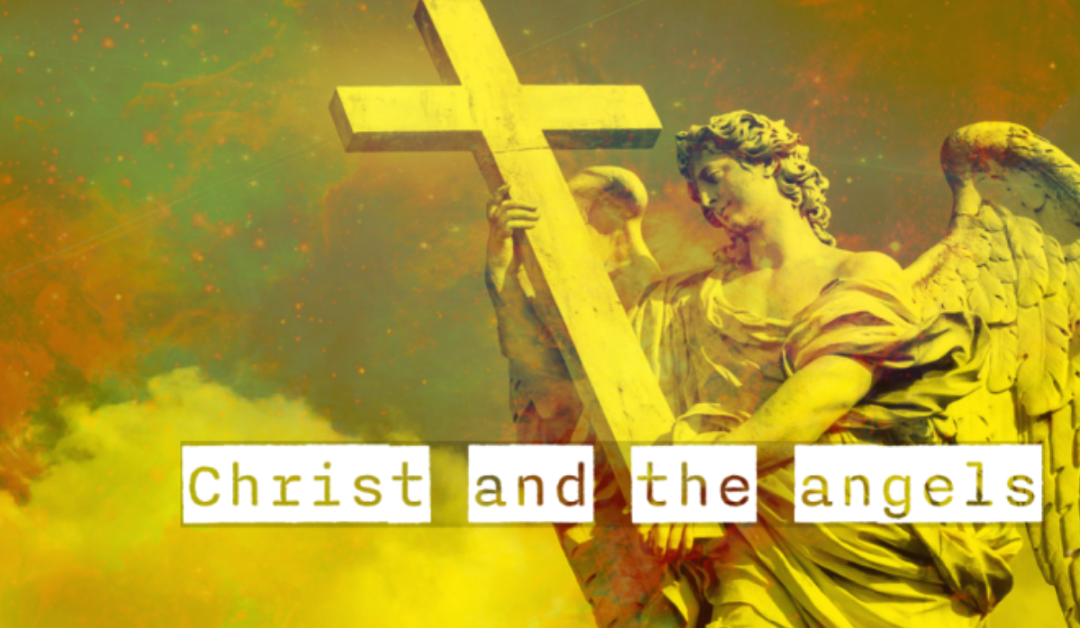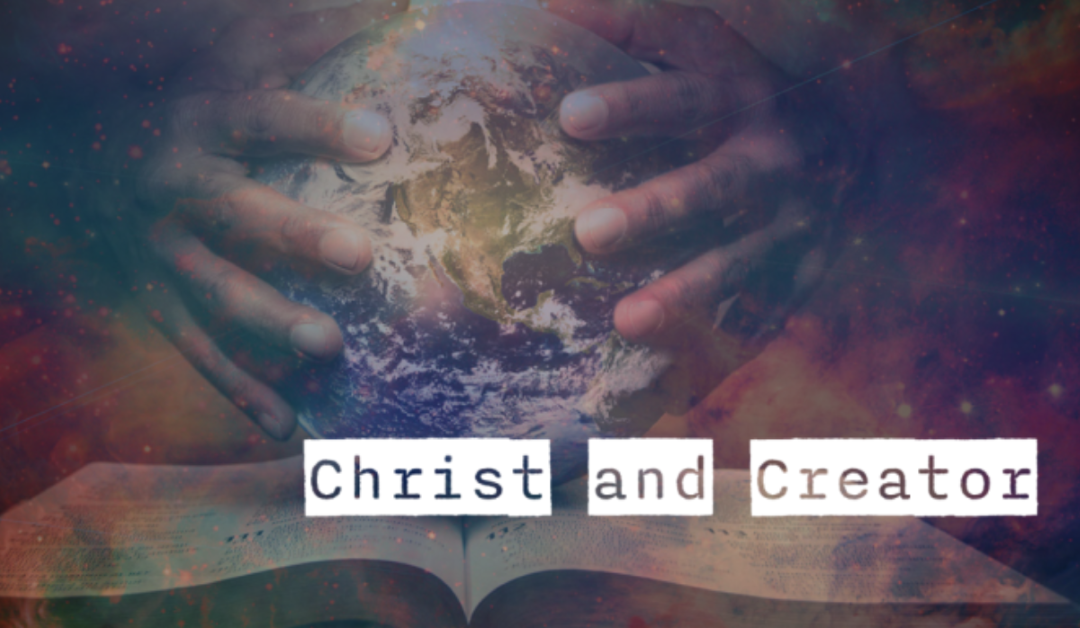Christ in relation to the angels:
In the book of Hebrews we find two passages concerning Christ in relation to the angels.
The first is Hebrews 1:4-14: which describes Jesus, the exalted Messiah,as higher, or better, than the angels.
The second is Hebrews 2:5-9: which describes Jesus, the Son of Man, as lower as the angels.
Angels played a very important role in Jewish culture and religion. One Rabbi is quoted as saying that every blade of grass has its angel.
Therefore – because angels are so important to the Jews – the author of the book of Hebrews compares Christ to the angels as to shed some more light on who He is.
The idea of these passages are to show the immortal and eternal aspects of the Messiah veiled in the mortal flesh of the Son.
We see the fullness of God revealed in the frailty of Jesus as man – the infinite folded into the finite, the Creator in the form of His creation.
The author of Hebrews uses the angels as a sort of teaching tool by which a basic Christology can be shared to the Jewish people specifically. As gentiles, though, and modern readers (although we were not the intended target audience), we can still glean very important insight if we read these passages intentionally and in context.
Christ: Higher than the angels
In Hebrews 1:4-14: we see how Christ is higher than the angels:
In verse 4 we read that Christ has, by inheritance, obtained a much greater name, a more excellent name.
In Ephesians we read the following:
Ephesians 1:19-22:
“19And what is the exceeding greatness of his power to us-ward who believe, according to the working of his mighty power, 20Which he wrought in Christ, when he raised him from the dead, and set him at his own right hand in the heavenly places, 21Far above all principality, and power, and might, and dominion, and every name that is named, not only in this world, but also in that which is to come: 22And hath put all things under his feet, and gave him to be the head over all things to the church…”
Peter, before the council of Jewish elders and rulers, in Acts 4:12: states that there is no other name in Heaven or on Earth by which to be saved – that the name of the Lord Christ Jesus is the name of Salvation.
Reading this we realize that His name is the only name, and the most excellent name, that there is no other name worthy of exaltation and glorification – no other name than Jesus.
Christ is often called the Son of God, as He is from the Father – He is the Father. None of the angels have the privilege of being called the Son of God, and none of the angels share in this glory. Later on we read that Christ is like a Son in His house – meaning He has dominion and authority. The angels have no authority except where God allows it, but Christ – having the name above every name – has total dominion. (Verses 5-6)
And then we read (In verse 6) that when God brings the Firstbegotten, Jesus, into the world He says – Let all the angels of God worship Him.
In Psalm 18:3: David writes:
3I will call upon the LORD, who is worthy to be praised: so shall I be saved from mine enemies.
Earlier we read that there is only one name! One name through which we have our redemption, our salvation, our freedom – and that is the name of Christ! Jesus Christ, being God, is worthy of all the praise and honor, worthy of al exaltation and adoration, magnification and glory! Christ is worthy!
The angels bow before His throne, and worship Him.
Who makes His angels spirits and His ministers a flame of fire? In verse 7 and 14 we are taught that angels are but ministering spirits –that they are sent forth to minister to those who will inherit salvation.
In Psalm 91:11-12: we read –
11For he shall give his angels charge over thee, to keep thee in all thy ways. 12They shall bear thee up in their hands, lest thou dash thy foot against a stone.
God commands His angels concerning us – to guard us in all our ways – to keep us from harm – but they are not Mighty to Save. They cannot save us from death and sin and disease. God uses them to minister to us – that is true – but Christ is salvation and healing and freedom! Christ is the one and only High Priest and King.
In verse 8 we find that Christ is God – and God Himself confirms it – we read:
8But unto the Son he saith, Thy throne, O God, is for ever and ever: a sceptre of righteousness is the sceptre of thy kingdom.
God Himself says unto the Son – Thy throne, O God, is for ever!
Deuteronomy 6:4: and John 1:1: it is confirmed – God is one and we know that He would never do or say anything contradictory His word – therefore Christ is God!
In the same verse also we read that ‘a scepter of righteousness is the scepter of thy kingdom.’ Christ lived a spotless life on Earth – unblemished and pure – He lived a righteous life. In Psalm 1 we read that it is the righteous man who is like a tree planted by mighty rivers – but that the wicked is like chaff blown in the wind. This translates into life as follows – He who is firmly rooted in Christ (The source of Living Water) shall live a righteous life (Being as a tree planted by the Living Waters). Righteousness is the core of His teaching, His life and His ministry and is therefore also the centre of His kingdom – the Scepter of His Kingdom!
We also find that He authority over all things – if righteousness is the Scepter of His Kingdom – than He must be the King. In verse 13 we read:
13But to which of the angels said he at any time, Sit on my right hand, until I make thine enemies thy footstool?
And Peter on the day of Pentecost shared the following with the crowd:
32This Jesus hath God raised up, whereof we all are witnesses. 33Therefore being by the right hand of God exalted, and having received of the Father the promise of the Holy Ghost, he hath shed forth this, which ye now see and hear. 34For David is not ascended into the heavens: but he saith himself, The LORD said unto my Lord, Sit thou on my right hand, 35Until I make thy foes thy footstool. (Acts 2:32-35)
It is Christ who is the exalted right hand of God – the Holy One who saw no corruption – who loosened the pains of death. Jesus – being raised up in glory and seated on the Throne of God.
In verse 9 we read that Christ has been anointed with the oil of gladness by God – because He has loved righteousness. Christ is the Holy and Anointed One. He is the Priest, Prophet and King of the world!
He is the eternal and unchanging one.
Hebrews 1:10-12:
10And, Thou, Lord, in the beginning hast laid the foundation of the earth; and the heavens are the works of thine hands: 11They shall perish; but thou remainest; and they all shall wax old as doth a garment; 12And as a vesture shalt thou fold them up, and they shall be changed: but thou art the same, and thy years shall not fail.
Daniel has this vision in Daniel 7:13-14:
13I saw in the night visions, and, behold, one like the Son of man came with the clouds of heaven, and came to the Ancient of days, and they brought him near before him. 14And there was given him dominion, and glory, and a kingdom, that all people, nations, and languages, should serve him: his dominion is an everlasting dominion, which shall not pass away, and his kingdom that which shall not be destroyed.
We see once more His authority in the Daniel passage, but we also read in the fourteenth verse that His kingdom is everlasting – that His kingdom, His dominion, shall not be destroyed, nor shall it ever pass away.
The author of the book of Hebrews states that all things may perish, but Christ shall never perish – that His dominion is forever. He states that all things will grow old and fade, and may be folded by Him and changed – but He is the same forever!
Eternal and unchanging.
In verse thirteen the question is asked – to which of His angels has He said, at any time – sit at my right hand until I make thine enemies thy footstool?
In verse 9 we read that God has anointed Him, has chosen Him above His fellows, but in the thirteenth verse we find that He is exalted above His enemies as well, that they are His footstool. Glorious!
Christ has been chosen, anointed, above all things – every living creature, and principality – He has been exalted above all things on Heaven and in Earth.
Ephesians 1:21-22: testifies of this fact when Paul states that Christ is:
21Far above all principality, and power, and might, and dominion, and every name that is named, not only in this world, but also in that which is to come: 22And hath put all things under his feet, and gave him to be the head over all things to the church,
Finally, in verse 14 we read that the angels are but ministering spirits sent forth to minister to those who will inherit salvation.
Easton’s Bible Dictionary (Easton, 1897) has the following to say about angels:
“a word signifying, both in the Hebrew and Greek, a “messenger,” and hence employed to denote any agent God sends forth to execute his purposes. It is used of an ordinary messenger (Job 1:14: 1 Sam. 11:3; Luke 7:24; 9:52), of prophets (Isa. 42:19; Hag. 1:13), of priests (Mal. 2:7), and ministers of the New Testament (Rev. 1:20). It is also applied to such impersonal agents as the pestilence (2 Sam. 24:16, 17; 2 Kings 19:35), the wind (Ps. 104:4). But its distinctive application is to certain heavenly intelligences whom God employs in carrying on his government of the world. The name does not denote their nature but their office as messengers.”
As an example we will read from Luke 2:8-10:
8And there were in the same country shepherds abiding in the field, keeping watch over their flock by night. 9And, lo, the angel of the Lord came upon them, and the glory of the Lord shone round about them: and they were sore afraid. 10And the angel said unto them, Fear not: for, behold, I bring you good tidings of great joy, which shall be to all people.
Easton’s Bible Dictionary goes on to say this about the nature of angels:
“As to their nature, they are spirits (Heb. 1:14), like the soul of man, but not incorporeal. Such expressions as “like the angels” (Luke 20:36), and the fact that whenever angels appeared to man it was always in a human form (Gen. 18:2; 19:1, 10; Luke 24:4; Acts 1:10), and the titles that are applied to them (“sons of God,” Job 1:6; 38:7; Dan. 3:25; comp. 28) and to men (Luke 3:38), seem all to indicate some resemblance between them and the human race. Imperfection is ascribed to them as creatures (Job 4:18; Matt. 24:36; 1 Pet. 1:12). As finite creatures they may fall under temptation; and accordingly we read of “fallen angels.” Of the cause and manner of their “fall” we are wholly ignorant. We know only that “they left their first estate” (Matt. 25:41; Rev. 12:7,9), and that they are “reserved unto judgement” (2 Pet. 2:4). When the manna is called “angels’ food,” this is merely to denote its excellence (Ps. 78:25). Angels never die (Luke 20:36). They are possessed of superhuman intelligence and power (Mark 13:32; 2 Thess. 1:7; Ps. 103:20). They are called “holy” (Luke 9:26), “elect” (1 Tim. 5:21). The redeemed in glory are “like unto the angels” (Luke 20:36). They are not to be worshipped (Col. 2:18; Rev. 19:10). (3.) Their functions are manifold. (a) In the widest sense they are agents of God’s providence (Ex. 12:23; Ps. 104:4; Heb. 11:28; 1 Cor. 10:10; 2 Sam. 24:16; 1 Chr. 21:16; 2 Kings 19:35; Acts 12:23).”
Angels are agents of God’s providence – that is to say – His intervention. They are messengers called to carry out God’s redemptive work – not His work of total redemption, but to minister to those in need and danger – to deliver God’s children from afflictions and tribulations.
This being said – it is of utmost importance that their ministry greatly differs from the redemptive ministry of Christ. Their call is to minister to those who will inherit salvation.
Hebrews 1:14:
14Are they not all ministering spirits, sent forth to minister for them who shall be heirs of salvation? (Emphasis own)
And also, we read in Zephaniah 3:17:
17The LORD thy God in the midst of thee is mighty; he will save, he will rejoice over thee with joy; he will rest in his love, he will joy over thee with singing. (Emphasis own).
Christ is the mighty one who will save! The angels minister to those who will inherit salvation, but Christ is salvation.
To summarize we find that Christ is regarded higher than the Angels for the following reasons:
-
He has inherited a more excellent name. (v.4)
-
Christ is the Son of God – and has authority as such. (v.5)
-
He is worthy of praise and adoration, and the angels worship Him. (v.6)
-
The angels are ministering spirits but Christ is the anointed messiah – the chosen savior. (v. 7-8)
-
Christ is God. (v.8)
-
Christ is totally righteous – pure and unblemished – the spotless Lamb of God. (v.8)
-
Christ is the King. (v. 8)
-
Christ is the Holy and Anointed one. (v.9)
-
He is eternal and unchanging. (v.10-12)
-
He is above all – the sovereign Lord. (v.13)
-
The angels are ministering spirits to the inheritors of Salvation, but Christ is Salvation!


